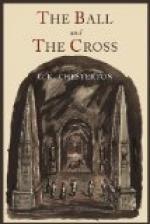“Catholic virtue is often invisible because it is the normal,” answered MacIan. “Christianity is always out of fashion because it is always sane; and all fashions are mild insanities. When Italy is mad on art the Church seems too Puritanical; when England is mad on Puritanism the Church seems too artistic. When you quarrel with us now you class us with kingship and despotism; but when you quarrelled with us first it was because we would not accept the divine despotism of Henry VIII. The Church always seems to be behind the times, when it is really beyond the times; it is waiting till the last fad shall have seen its last summer. It keeps the key of a permanent virtue.”
“Oh, I have heard all that!” said Turnbull with genial contempt. “I have heard that Christianity keeps the key of virtue, and that if you read Tom Paine you will cut your throat at Monte Carlo. It is such rubbish that I am not even angry at it. You say that Christianity is the prop of morals; but what more do you do? When a doctor attends you and could poison you with a pinch of salt, do you ask whether he is a Christian? You ask whether he is a gentleman, whether he is an M.D.—anything but that. When a soldier enlists to die for his country or disgrace it, do you ask whether he is a Christian? You are more likely to ask whether he is Oxford or Cambridge at the boat race. If you think your creed essential to morals why do you not make it a test for these things?”
“We once did make it a test for these things,” said MacIan smiling, “and then you told us that we were imposing by force a faith unsupported by argument. It seems rather hard that having first been told that our creed must be false because we did use tests, we should now be told that it must be false because we don’t. But I notice that most anti-Christian arguments are in the same inconsistent style.”
“That is all very well as a debating-club answer,” replied Turnbull good-humouredly, “but the question still remains: Why don’t you confine yourself more to Christians if Christians are the only really good men?”
“Who talked of such folly?” asked MacIan disdainfully. “Do you suppose that the Catholic Church ever held that Christians were the only good men? Why, the Catholics of the Catholic Middle Ages talked about the virtues of all the virtuous Pagans until humanity was sick of the subject. No, if you really want to know what we mean when we say that Christianity has a special power of virtue, I will tell you. The Church is the only thing on earth that can perpetuate a type of virtue and make it something more than a fashion. The thing is so plain and historical that I hardly think you will ever deny it. You cannot deny that it is perfectly possible that tomorrow morning, in Ireland or in Italy, there might appear a man not only as good but good in exactly the same way as St. Francis of Assisi. Very well, now take the other types




